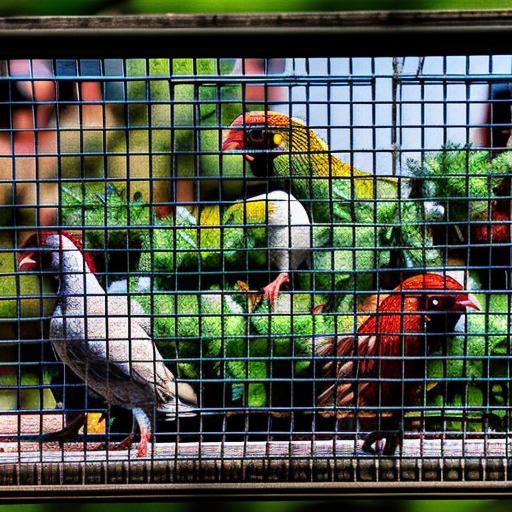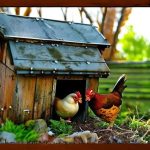Urban chicken-keeping has become increasingly popular in cities across the United States, and the District of Columbia is no exception. Many residents are embracing the idea of raising their own chickens for eggs and meat, as well as for the enjoyment and satisfaction that comes with caring for these feathered friends. However, before embarking on this endeavor, it is important to understand the legal requirements and regulations surrounding urban chicken-keeping in DC. By familiarizing yourself with these guidelines, you can ensure that you are in compliance with the law and create a safe and healthy environment for your chickens.
Key Takeaways
- Legal requirements for keeping chickens in DC include obtaining a permit, following zoning regulations, and providing adequate living space.
- When finding space for your urban chicken coop, consider factors such as sunlight, ventilation, and protection from predators.
- The best chicken breeds for your DC backyard flock depend on your goals, climate, and personal preferences.
- Feeding and caring for your chickens in DC involves providing a balanced diet, clean water, and regular health check-ups.
- To keep your chickens safe from predators in an urban environment, use secure fencing, lock up your coop at night, and be aware of common threats such as rats and raccoons.
Understanding the Legal Requirements for Keeping Chickens in DC
When it comes to keeping chickens in DC, there are certain zoning regulations and permitting processes that must be followed. Zoning regulations dictate where chickens can be kept within the city limits, and it is important to check with your local zoning office to determine if your property is eligible for chicken-keeping. Additionally, a permit may be required to keep chickens, and this process typically involves submitting an application and paying a fee.
In terms of the number of chickens allowed, DC regulations typically limit the number to six hens per property. Roosters are generally not allowed due to noise concerns. It is important to adhere to these regulations to avoid any potential fines or penalties.
Finding the Right Space for Your Urban Chicken Coop
Once you have determined that you are legally allowed to keep chickens on your property, it is important to find the right space for your urban chicken coop. The size of the coop will depend on the number of chickens you plan to keep, but a general rule of thumb is to provide at least 4 square feet of space per chicken. This allows them enough room to move around comfortably.
When choosing a location for your coop, consider factors such as sunlight exposure, ventilation, and proximity to your home. Chickens need access to natural light and fresh air, so it is important to place the coop in an area that receives adequate sunlight and has good airflow. Additionally, consider the proximity to your home for ease of access and monitoring.
Materials needed for your coop include lumber for framing, wire mesh for fencing, and roofing materials for protection from the elements. It is important to choose materials that are durable and weather-resistant to ensure the longevity of your coop.
Choosing the Best Breeds for Your DC Backyard Flock
When selecting breeds for your DC backyard flock, there are several factors to consider. First and foremost, consider the climate in DC. Summers can be hot and humid, while winters can be cold and snowy. Choose breeds that are well-suited to these conditions to ensure their health and well-being.
Egg-laying abilities are also an important consideration. If your primary goal is to have a steady supply of fresh eggs, choose breeds known for their prolific egg-laying abilities. Some popular choices include Rhode Island Reds, Leghorns, and Australorps.
Temperament is another important factor to consider, especially if you have children or pets. Some breeds are known to be more docile and friendly, while others may be more skittish or aggressive. Research different breeds and choose ones that are known for their friendly and calm demeanor.
Feeding and Caring for Your Chickens in the Nation’s Capital
Proper nutrition is essential for the health and well-being of your chickens. A balanced diet should consist of a combination of commercial chicken feed, fresh fruits and vegetables, and access to insects and worms. It is important to provide clean water at all times and monitor their food intake to ensure they are getting the necessary nutrients.
In terms of health considerations, regular check-ups with a veterinarian experienced in poultry care are recommended. Vaccinations may be necessary to protect against common diseases such as Marek’s disease and Newcastle disease. Additionally, regular cleaning and maintenance of the coop is important to prevent the spread of parasites and diseases.
Establishing a daily care routine is essential for the well-being of your chickens. This includes feeding them at the same time each day, checking for any signs of illness or injury, and providing them with fresh bedding and clean water. Regularly collecting eggs and cleaning the nesting boxes is also important to maintain a clean and hygienic environment.
Keeping Your Chickens Safe from Predators in an Urban Environment

While urban environments may seem less prone to predators, there are still risks that need to be considered when keeping chickens in DC. Common predators in the area include raccoons, foxes, and rats. It is important to take measures to secure your coop and protect your chickens from these potential threats.
Coop security measures include using sturdy fencing with small gaps to prevent predators from entering the coop. Reinforce the coop with hardware cloth or wire mesh to prevent animals from digging under or climbing over. Additionally, consider installing motion-activated lights or alarms to deter predators.
Outdoor safety precautions include providing a secure outdoor run for your chickens to roam during the day. This should be covered with wire mesh to prevent aerial predators such as hawks or owls from swooping down. It is also important to remove any potential hiding spots for predators, such as overgrown vegetation or debris.
Understanding the Health Risks Associated with Raising Chickens in DC
While raising chickens can be a rewarding experience, it is important to be aware of the potential health risks associated with handling poultry. One of the main risks is salmonella, a bacteria commonly found in chicken feces. It is important to practice good hygiene when handling chickens, including washing hands thoroughly after touching them or their eggs.
Another concern is avian influenza, a viral disease that can affect both wild birds and domestic poultry. It is important to monitor your chickens for any signs of illness, such as coughing, sneezing, or a decrease in egg production. If you suspect your chickens may be infected, contact a veterinarian immediately.
Proper hygiene practices are essential for preventing the spread of diseases. This includes regularly cleaning and disinfecting the coop, washing hands after handling chickens or their eggs, and avoiding contact with wild birds or their droppings.
Managing Noise and Odor Issues with Your Backyard Chickens
Noise and odor issues can be a concern when keeping chickens in an urban environment. To minimize noise, consider choosing breeds that are known to be quieter, such as Silkies or Cochins. Additionally, provide plenty of enrichment and stimulation for your chickens to keep them occupied and reduce excessive vocalization.
Odor control methods include regularly cleaning the coop and removing soiled bedding. Consider using absorbent materials such as straw or wood shavings to help control odors. Additionally, composting chicken manure can help reduce odor and provide nutrient-rich fertilizer for your garden.
Communication with your neighbors is key when it comes to managing noise and odor issues. Let them know about your plans to keep chickens and address any concerns they may have. Offer to share fresh eggs as a gesture of goodwill and maintain open lines of communication to address any issues that may arise.
Harvesting Eggs and Meat from Your DC Chickens
Harvesting eggs from your DC chickens is a rewarding experience. To ensure the freshness and quality of the eggs, collect them daily and store them in a cool place. It is important to wash the eggs before consuming them to remove any dirt or bacteria.
If you are interested in harvesting meat from your chickens, there are several options available. You can choose to process the meat yourself or take them to a local butcher who specializes in poultry processing. It is important to follow proper food safety guidelines when handling and preparing chicken meat to prevent the risk of foodborne illnesses.
Connecting with the Local Urban Farming Community in DC
The District of Columbia has a vibrant urban farming community, and there are many resources and organizations available to support and connect with fellow chicken-keepers. Local resources such as urban farming websites, forums, and social media groups can provide valuable information and advice. Additionally, community events and workshops are often held to educate and engage urban farmers.
Networking opportunities are also available through local urban farming organizations. These groups often host meet-ups or networking events where you can connect with other like-minded individuals and share experiences and knowledge. Building a network of fellow chicken-keepers can provide support and guidance throughout your urban chicken-keeping journey.
Embracing the Benefits of Urban Chicken-Keeping in the District of Columbia
There are numerous benefits to embracing urban chicken-keeping in the District of Columbia. One of the main benefits is sustainable living practices. Raising your own chickens allows you to have a direct source of fresh eggs and meat, reducing your reliance on store-bought products. Additionally, chickens produce nutrient-rich manure that can be used as fertilizer for your garden, promoting sustainable gardening practices.
Urban chicken-keeping also provides educational opportunities for both children and adults. Caring for chickens teaches responsibility, empathy, and the importance of sustainable food production. It also provides an opportunity to learn about biology, animal behavior, and the natural world.
Lastly, raising chickens can bring enjoyment and satisfaction to your life. Chickens are social animals that can provide companionship and entertainment. Watching them scratch in the dirt, interact with each other, and lay eggs can be a rewarding experience that brings joy to your everyday life.
In conclusion, urban chicken-keeping in the District of Columbia offers a unique opportunity to connect with nature, promote sustainable living practices, and enjoy the benefits of raising your own chickens. By understanding the legal requirements, finding the right space for your coop, choosing the best breeds, and providing proper care and nutrition, you can create a safe and healthy environment for your chickens. Additionally, by connecting with the local urban farming community, you can gain valuable knowledge and support throughout your urban chicken-keeping journey. So why not take the leap and start your own backyard flock in DC? With proper planning and preparation, you can enjoy the many rewards that come with raising chickens in the nation’s capital.
If you’re wondering if you can keep chickens in Washington, D.C., the answer is yes! There are specific regulations and guidelines to follow, but it is definitely possible to have your own backyard flock. To learn more about the requirements and how to set up a chicken coop in the city, check out this informative article on Poultry Wizard: Chicken Coop Portage. It provides valuable insights and tips on creating a suitable environment for your feathered friends. Additionally, if you’re looking for ideas on chicken coop designs and plans, you might find this article on Chicken Coop Run Plans helpful. Happy chicken keeping!
FAQs
What are the rules and regulations for keeping chickens in DC?
According to DC law, residents are allowed to keep up to six chickens in their backyard, as long as they are kept in a secure coop and run area. Roosters are not allowed.
Do I need a permit to keep chickens in DC?
Yes, residents are required to obtain a permit from the DC Department of Health before keeping chickens. The permit costs $50 and is valid for two years.
What are the requirements for the chicken coop and run area?
The coop and run area must be secure and predator-proof, with a minimum of 2 square feet of space per chicken in the coop and 8 square feet of space per chicken in the run. The coop must also have proper ventilation and be kept clean.
What are the health risks associated with keeping chickens?
Chickens can carry salmonella, which can be transmitted to humans through contact with their feces or eggs. It is important to practice good hygiene when handling chickens and their eggs, such as washing hands thoroughly after handling them.
What are the benefits of keeping chickens?
Keeping chickens can provide a source of fresh eggs, as well as fertilizer for gardens. They can also be entertaining pets and can help control pests in the yard.
Meet Walter, the feathered-friend fanatic of Florida! Nestled in the sunshine state, Walter struts through life with his feathered companions, clucking his way to happiness. With a coop that’s fancier than a five-star hotel, he’s the Don Juan of the chicken world. When he’s not teaching his hens to do the cha-cha, you’ll find him in a heated debate with his prized rooster, Sir Clucks-a-Lot. Walter’s poultry passion is no yolk; he’s the sunny-side-up guy you never knew you needed in your flock of friends!







